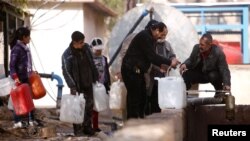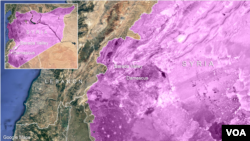A senior United Nations official says a water crisis affecting Syria's capital, Damascus, could trigger military action with devastating consequences unless vital supplies from the nearby, rebel-held Wadi Barada area, are restored.
Damascus gets most of its water from the Wadi Barada Valley. Damage to the infrastructure during battles between rebel and Syrian forces has cut off this vital source of water to the Syrian capital’s population of 5 million since December 22.
The U.N. special envoy for Syria, Staffan de Mistura, says it is a matter of great urgency that Syrian government engineers be allowed to go into the area to repair the damage so water once more can be pumped to Damascus. He says rebels in charge of the main water source in one of the five Wadi Barada villages will not agree to this.
“Therefore, there is a danger, substantial danger, imminent danger that this may develop into a further military escalation and the consequence of it, unavoidably, no water solution for the people in Damascus,” he said.
Fear of diseases
De Mistura warns of an outbreak of diseases in Damascus if the population continues to be deprived of safe water. He says failure to restore this vital water source also will have a negative impact on efforts to restart the peace process for Syria.
He says discussions that are under way in Russia and Turkey to try to resolve this issue are important for two reasons.
"The first one, water in Damascus is vital… because it is affecting 5 million people. And B, because it does have potentially, if it escalates, an impact on the Astana talks and meetings, which is based as you know on the concept of a well-established, potentially, even better established cessation of hostilities.”
Russia and Turkey are scheduled to broker talks aimed at negotiating a cease-fire in Syria’s long-running civil war in Astana, the capital of Kazakhstan, on January 23. Iran and the United Nations have been invited to attend.
The U.N. hopes to resume dormant political negotiations for an end to Syria’s nearly six-year-long civil war on February 8. De Mistura says a successful outcome of the Astana talks could be a stepping stone for a successful political meeting on Syria.






